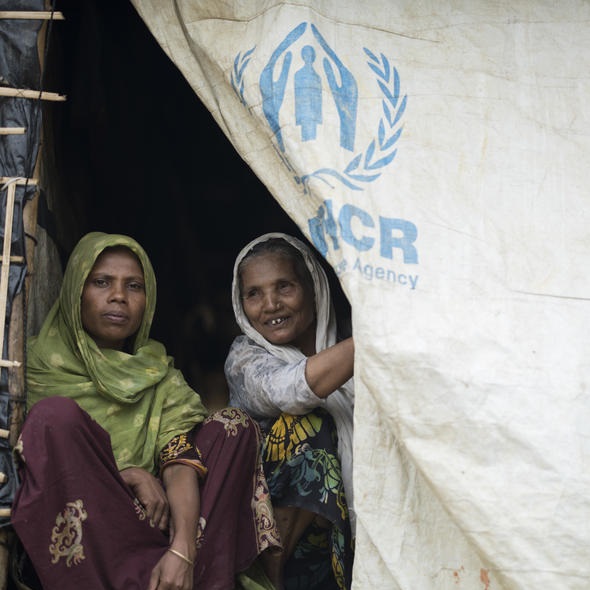Standardized Expanded Nutrition Survey (SENS) - 2018
Nepal, 2020 - 2021
Get MicrodataIdentification
UNHCR_NPL_2018_SENS_v2.1
Standardized Expanded Nutrition Survey (SENS) - 2018
| Name | Country code |
|---|---|
| Nepal | NPL |
The UNHCR Standardized Expanded Nutrition Surveys (SENS) provide regular nutrition data that play a key role in delivering effective and timely interventions to ensure good nutritional outcomes among populations affected by forced displacement. This survey was conducted in October 2018 in Beldangi and Sanischare Refugee Camps Nepal to measure the nutrition status of Bhutanese refugees, located in Province 1, Jhapa and Morang Districts. At the time of the survey, there were 6,656 refugees living in both camps, following a large resettlement programme in previous years. UNHCR and partners work in consultation with the local government to increase refugees’ access to nearby government health facilities to achieve sustainable and adequate health services for both refugees and local communities. The nutrition programme was discontinued from the camps in 2016 considering the camp stability, population reduction and improved nutrition status.
The main objective of the nutrition survey was to assess the prevalence of malnutrition and anaemia in children aged 6-59 months and anaemia prevalence in non-pregnant women 15-49 years old and formulate workable recommendations for appropriate nutritional and public health interventions. Additional data was collected on coverage of vitamin A supplementation, deworming, supplementary feeding programme, antenatal care program and Infant and young child feeding (IYCF) practicesin the camps.
Sample survey data [ssd]
- Children 0-5 months
- Children 6-59 months
- Women 15-49 months
Version
v2.1: Edited, anonymous dataset for licensed distribution.
Scope
- Children 0-23 months: feeding practices
- Children 6-59 months: prevalence of acute malnutrition, underweight, stunting and anaemia, coverage of vit A supplementation, and prevalence of diarrhoea
- Women 15-49 years: prevalence of anaemia
| Topic |
|---|
| Health and Nutrition |
| Health |
Coverage
The SENS survey was conducted in Nepal's Beldangi and Sanischare Refugee Camps.
All children aged 0-59 months as well as women aged 15-49 years registered in UNHCR's database and living in one of the camps were eligible to participate in the survey.
Producers and sponsors
| Name |
|---|
| UNHCR |
Sampling
The survey was developed using the SMART methodology and UNHCR Standardised Expanded Nutrition Survey (SENS) guidelines for refugee populations. Simple random sampling was applied to generate the survey sample of children (0-59 months) and women of reproductive age (15-49 years) using the list of eligible subjects generated by UNHCR ProGres.
All children aged 0-59 months, women aged 15-49 years registered in UNHCR ProGres and living in the camps are eligible for inclusion in the survey population. UNHCR ProGres provided a list of all eligible women (n=1595) and children (n=498) within the population of 6656 by end of September 2018. The sample size was calculated using SMART methodology and ENA for SMART software. The sample size was calculated as to estimate the prevalence of GAM with a precision of 5 % and a Confidence Interval (CI) of 95%. Estimated prevalence of GAM of 5.8% was based on the results of the nutrition survey conducted in September 2014.The sample size was adjusted for a 10% non-response rate and due to the small population size (<10000), a correction factor was applied.
- Children 0-5 months:100% (23/23)
- Children 6-59 months: 82.5% (127/154)
- Women 15-49 months: 88% (132/150)
Sample weights were calculated seperately for each women and children dataset.
Data collection
| Start | End |
|---|---|
| 2020-11-24 | 2021-02-09 |
| Name |
|---|
| UNHCR |
A total of six survey teams composed of four members each were conducting the data collection. A two days training with one day pre-test was conducted by UNHCR and partner's medical coordinator. The survey team included 22 refugee incentive workers from the camps. Each survey team member with direct interaction with respondents was fluent in Nepali, the local language. The lab technicians were formally trained in laboratory science. During the survey day, the survey manager supervised the survey members to ensure adherence to measurement protocols and smooth progression of the
survey.Anthropometric measurements, haemoglobin tests and interviews were conducted by trained and experienced survey members.
All interviews, anthropometric and clinical data collections were performed in the AMDA Primary Health Care Centre (PHCC) of Beldangi and Sanischare camps. Selected children were identified and their primary care givers were requested to come on the day of the survey with Road to Health Cards (RTH) cards. The RTH card includes the child’s date of birth, growth progress, immunization status and receipt of vitamin A and deworming tablets. The survey participants, women and children living in camps received instructions and guidance to present at the PHC on different time slots for a smooth progression of the survey and to reduce waiting time. As children and women arrived at the PHCC, their arrival was recorded on the sample list. Women included in the survey were requested to bring their ID card. At the end of each survey day, CHWs visited the households to recruit selected children and women yet unaccounted for by the survey. The registration list was used to ensure the number of completed questionnaires was equal to the number of registered women and children who participated in the survey.
Data Access
| Name | Affiliation | |
|---|---|---|
| Curation Team | UNHCR | microdata@unhcr.org |
UNHCR (2021). Nepal: Post-Distribution Monitoring of Cash-Based Intervention, February 2021. Accessed from: https://microdata.unhcr.org.
Metadata production
| Name |
|---|
| UNHCR |
2021
Metadata version
v1.0
